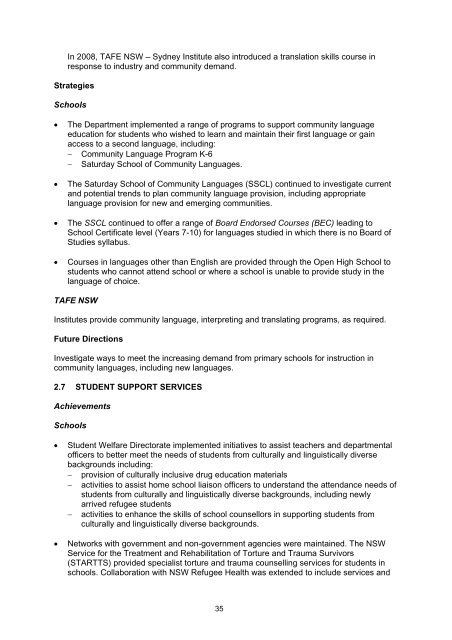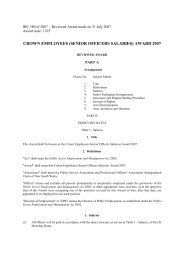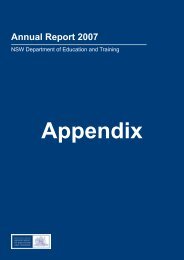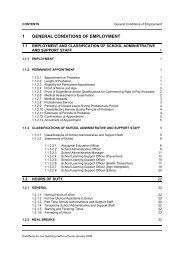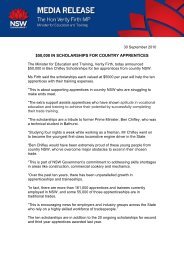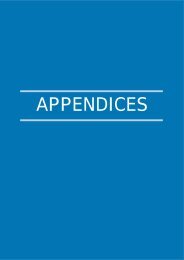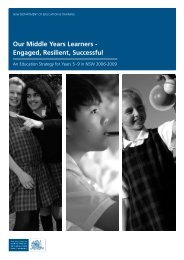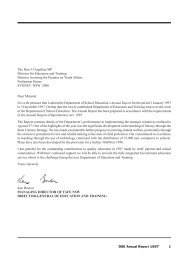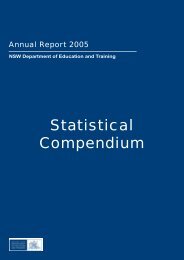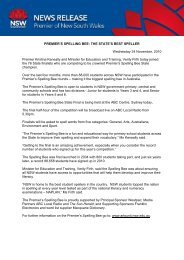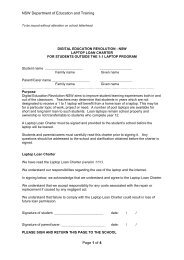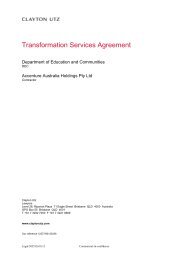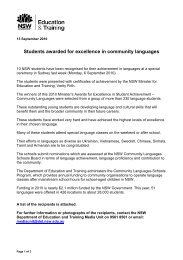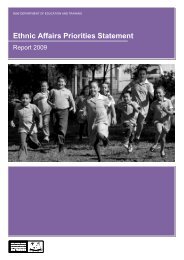NSW Department of Education and Training
NSW Department of Education and Training
NSW Department of Education and Training
You also want an ePaper? Increase the reach of your titles
YUMPU automatically turns print PDFs into web optimized ePapers that Google loves.
In 2008, TAFE <strong>NSW</strong> – Sydney Institute also introduced a translation skills course in<br />
response to industry <strong>and</strong> community dem<strong>and</strong>.<br />
Strategies<br />
Schools<br />
<br />
<br />
<br />
<br />
The <strong>Department</strong> implemented a range <strong>of</strong> programs to support community language<br />
education for students who wished to learn <strong>and</strong> maintain their first language or gain<br />
access to a second language, including:<br />
Community Language Program K-6<br />
Saturday School <strong>of</strong> Community Languages.<br />
The Saturday School <strong>of</strong> Community Languages (SSCL) continued to investigate current<br />
<strong>and</strong> potential trends to plan community language provision, including appropriate<br />
language provision for new <strong>and</strong> emerging communities.<br />
The SSCL continued to <strong>of</strong>fer a range <strong>of</strong> Board Endorsed Courses (BEC) leading to<br />
School Certificate level (Years 7-10) for languages studied in which there is no Board <strong>of</strong><br />
Studies syllabus.<br />
Courses in languages other than English are provided through the Open High School to<br />
students who cannot attend school or where a school is unable to provide study in the<br />
language <strong>of</strong> choice.<br />
TAFE <strong>NSW</strong><br />
Institutes provide community language, interpreting <strong>and</strong> translating programs, as required.<br />
Future Directions<br />
Investigate ways to meet the increasing dem<strong>and</strong> from primary schools for instruction in<br />
community languages, including new languages.<br />
2.7 STUDENT SUPPORT SERVICES<br />
Achievements<br />
Schools<br />
<br />
<br />
Student Welfare Directorate implemented initiatives to assist teachers <strong>and</strong> departmental<br />
<strong>of</strong>ficers to better meet the needs <strong>of</strong> students from culturally <strong>and</strong> linguistically diverse<br />
backgrounds including:<br />
<br />
<br />
<br />
provision <strong>of</strong> culturally inclusive drug education materials<br />
activities to assist home school liaison <strong>of</strong>ficers to underst<strong>and</strong> the attendance needs <strong>of</strong><br />
students from culturally <strong>and</strong> linguistically diverse backgrounds, including newly<br />
arrived refugee students<br />
activities to enhance the skills <strong>of</strong> school counsellors in supporting students from<br />
culturally <strong>and</strong> linguistically diverse backgrounds.<br />
Networks with government <strong>and</strong> non-government agencies were maintained. The <strong>NSW</strong><br />
Service for the Treatment <strong>and</strong> Rehabilitation <strong>of</strong> Torture <strong>and</strong> Trauma Survivors<br />
(STARTTS) provided specialist torture <strong>and</strong> trauma counselling services for students in<br />
schools. Collaboration with <strong>NSW</strong> Refugee Health was extended to include services <strong>and</strong><br />
35


